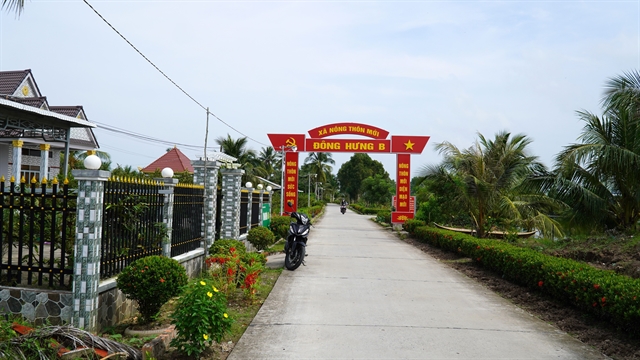 Society
Society

 |
| A village road in Đông Hưng B, a new-style rural commune in Kiên Giang Province’s An Minh District, is paved, clean and beautiful. — VNA/VNS Photo Văn Sĩ |
KIÊN GIANG — Kiên Giang Province has made significant achievements in developing new-style rural areas, improving their appearance and the lives of local people.
The Cửu Long (Mekong) Delta province has 108 of its 116 communes recognised under the national programme for building new-style rural areas.
They include five advanced new-style rural communes.
To get the recognition, a commune must meet the programme’s 19 criteria related to infrastructure, irrigation, electricity, environment, income, education, healthcare, social security, culture, and others. An advanced new-style rural commune requires higher standards across all of them.
Lê Hữu Toàn, deputy director of the provincial Department of Agriculture and Rural Development, said the programme has helped improve the appearance of rural areas and the lives of residents there.
Infrastructure, especially power supply, roads, schools, health centres, cultural facilities, and irrigation works, has received adequate investment and meets development needs, he said.
All inland communes in the province have most of their roads paved with cement or asphalt, making travel and transport of goods easy.
Irrigation projects like the Cái Lớn-Cái Bé sluice system, the largest of its kind in the delta, and saltwater prevention sluices along the province’s sea dyke have helped make agricultural production safe, sustainable and effective and adapt to climate change.
The province has developed concentrated farming areas, including large-scale rice fields and concentrated shrimp breeding areas.
The per capita income in rural areas has increased from VNĐ46.7 million (US$1,900) in 2020 to VNĐ57.8 million ($2,400) now.
Rural people actively participate in the programme after seeing its benefits.
Nguyễn Thanh Hồng of Tràm Dưỡng Hamlet in Hòn Đất District’s Mỹ Phước Commune, said his locality is low-lying and its soil is affected by alum, but after the district built an irrigation system, local farmers have increased intensive farming and production.
They produce two rice crops a year and use advanced farming techniques and machinery, and these help increase rice yields and output, he said.
The incomes of local people have increased, he said.
“I now have a good income and whenever local authorities launch a movement for building new style rural area such as building roads, bridges and houses for poor households, I always support and actively participate in it.”
The province aims to have all of its 116 communes recognised as new-style rural communes, with 40 designated as advanced new-style rural communes and 15 as exemplary new-style rural communes by 2025.
An exemplary new-style rural commune is held to higher standards than an advanced one.
The province also targets completing the development of new-style rural communes in four more districts, Kiên Lương, An Biên, Kiên Hải, and An Minh, by 2025.
Toàn emphasised that to achieve these targets, the province would review and enhance the quality of implementation of the programme’s 19 criteria.
It plans to strengthen advocacy to raise awareness among Government officials, staff and rural residents about the programme, and expand effective and creative models for building new-style rural areas.
Preferential policies will be adopted to boost the construction of new-style rural areas, develop concentrated farming areas for domestic consumption and export, and improve the operating capacity of agriculture cooperatives with linkages with other stakeholders for developing value chains.
Efforts will also be made to improve rural infrastructure and advance the national “One Commune-One Product” programme by promoting the sales of the products. VNS




